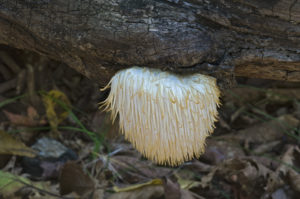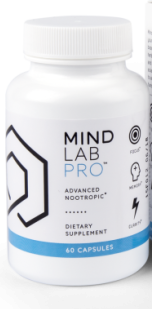Table of Contents
Lion’s Mane (Hericium erinaceus) is unique in the mushroom family both in appearance and function. Lion’s Mane Mushroom is extremely effective at stimulating Nerve Growth Factor (NGF) in the brain.
Known for its powerful effects as a “brain tonic”, Lion’s Mane is said to have been used as a tea for thousands of years by Buddhist monks. To enhance brain power, and heighten their ability to focus during meditation.
Lion’s Mane as a nootropic, is a powerful catalyst for brain cell regeneration helping improve memory and cognition.
The primary active compounds in Lion’s Mane are hericenones and erinacines. Erinacines help your brain produce more Nerve Growth Factor. Erinacines easily cross the blood-brain barrier to boost the production of neurons.
Lion’s Mane helps:
- Nerve Growth Factor. Lion’s Mane Mushroom prevents and treats nerve damage in the brain. Once past the blood-brain barrier, Lion’s Mane stimulates enzyme production that release Nerve Growth Factor (NGF). Nerve regeneration helps relieve neurodegenerative disease symptoms such as Alzheimer’s, dementia, and Parkinson’s Disease.
- Neurogenesis. Lion’s Mane stimulates the repair and creation of neurons. Boosting neurotransmitters and signaling that effects memory, learning, recall, and mood.
- Brain Optimization. Lion’s Mane helps eliminate brain fog. Restoring memory and mental alertness. And improves anxiety and depression symptoms.
Overview
Lion’s Mane (Hericium erinaceus) is a medicinal mushroom proven to benefit the brain, nerves and immune system.
Unlike other mushrooms sporting a cap and stem, Lion’s Mane has long, flowing, white tendrils. Resembling a lion’s mane. Other names include Monkey’s Head, Bearded Tooth, Pom Pom Blanc, Hedgehog Mushroom and Satyr’s Beard.

This parasitic fungus grows hanging off logs and trees. And is native to North American, Europe and Southeast Asia. In Japan, it’s called yamabushitake or “those who sleep in mountains”. Referring to the Shugendo sect of hermit monks and their long, flowing robes.
As a nootropic, Lion’s Mane has been shown to be particularly effective in stimulating Nerve Growth Factor (NGF) in the brain.
NGF is produced in the hippocampus throughout life. Modulating cholinergic receptors and neuroplasticity.[i] And is essential for learning.
Nerve Growth Factor are special proteins that function to regenerate neurons. Lion’s Mane contains two unique classes of NGF’s – hericenones and erinacines which easily cross the blood-brain barrier.
Lion’s Mane, like other medicinal mushrooms, contain high amounts of the antioxidant beta-glucoxylan and four other polysaccharides and polypeptides. Having a significant impact on enhancing your immune system. And decreasing tumor growth.
Lion’s Mane has also been studied in reducing amyloid plaques. These clumps of beta-amyloid proteins block signals between neurons. And are implicated in Alzheimer’s and other neurodegenerative diseases.
Lions’ Mane is also used to treat Lyme’s Disease, and digestive tract issues.
Here we’re talking about Lion’s Mane Mushroom and its effects on brain health and chemistry.
How does Lion’s Mane Work in the Brain?
Lion’s Mane boosts brain health and function in several ways. But two in particular stand out.
- Lion’s Mane Mushroom stimulates the synthesis of Nerve Growth Factor (NGF). NGF is a protein that plays a major role in the maintenance, survival and regeneration of neurons.
NGF is required by your brain to keep neurons strong and healthy. When various neurological disorders occur, your brain is unable to produce its own internal source of NGF.
In a study done in Kuala Lumpur in 2013, scientists showed that Lion’s Mane extract induced NGF synthesis and promoted neurite outgrowth.[ii]
- Lion’s Mane is effective in reducing anxiety and depression. Some even call it the “smart mushroom” for its ability to improve cognition, memory and work as an anti-depressant.
A study by researchers in Japan worked with 30 women. The female subjects had been complaining about menopause, depression, sleep quality and other issues.
The women randomly received Lion’s Mane-laced cookies or a placebo for 4 weeks. The researchers found that Lion’s Mane “has the possibility to reduce depression and anxiety, and these results suggest a different mechanism from NGF-enhancing action of H. erinaceus”. [iii]
How things go bad
Science once believed that the brain could not grow new brain cells. That once our brain developed during childhood, and we reached adulthood, we had all the brain cells we’d ever have.
Now we know that neurons can regenerate. But that doesn’t mean they will regenerate. A number of health issues can contribute to neurodegeneration.
↓ Decrease in Nerve Growth Factor = Decrease in Long-Term Potentiation affecting long-term memory[iv]
↓ Brain cells die and are not replaced
↓ Neuroplasticity declines resulting in poor memory
↓ Neurotransmitters decline resulting in anxiety, poor mood and depression
All of these age-related changes are contributing factors to neurodegenerative diseases like Alzheimer’s, Parkinson’s and others. And anxiety, depression and mood disorders that affect quality of life.
Lion’s Mane benefits
At least a dozen peer-reviewed studies have been published on Lion’s Mane benefits to brain health since 1991. Dr. Kawagishi of Japan was first to identify Nerve Growth Factor properties in Lion’s Mane Mushroom.[v]
In one double-blind, placebo-controlled trial, researchers in Japan worked with 50 – 80 year old men and women. All suffered from mild cognitive impairment.
The trial subjects received four 250 mg tablets containing 96% of Yamabushitake (Lion’s Mane) dry powder three times a day for 16 weeks. The men and women were tested at 4, 8, 12 and 16 weeks.
At each of the testing periods, the subjects who had used Lion’s Mane showed a significant improvement in cognitive scores. And their scores were increasing while on Lion’s Mane supplementation. But 4 weeks after stopping Lion’s mane supplementation, their cognitive scores decreased significantly.
The researchers concluded that Lion’s Mane Mushroom is effective in improving mild cognitive impairment.[vi]
How does Lion’s Mane feel?
You may not experience the effects of supplementing with Lion’s Mane Mushroom immediately. But many users report with continued use of Lion’s Mane, a boost in mood and mental energy.
 Some report it increases depth perception. And an improvement in sense of smell.
Some report it increases depth perception. And an improvement in sense of smell.
Others testify to improved decision-making, the ability to solve problems and learning. Likely due to Lion’s Mane ability to improve neuroplasticity.
The overall consensus is Lion’s Mane Mushroom’s ability to lessen anxiety, reduce depression, and improve concentration.
Lion’s Mane Clinical Research
Lion’s Mane Mushroom has been used as a food and herbal medicine since ancient times in East Asia. And it has been reported in scientific research that Lion’s Mane promotes Nerve Growth Factor both in the petri dish as well as in animal and human test subjects.
Lion’s Mane Prevents Cognitive Dysfunction
In this study, researchers examined the effects of Lion’s Mane on amyloid β(25-35) peptide-induced learning and memory deficits in mice. Amyloid β(25-35) peptide is implicated in diseases like Alzheimer’s.
Mice were injected with the peptide on days 7 and 14 of the trial. And they were fed a diet containing Lion’s Mane over 23-days of the experiment. The results showed that Lion’s Mane prevented short-term and visual recognition memory reduction normally induced by amyloid β(25-35) peptide.
They concluded that Lion’s Mane Mushroom “may be useful in the prevention of cognitive dysfunction”.[vii]
Lion’s Mane Induces Nerve Growth Factor
In this trial, mice were fed Lion’s Mane 5% freeze-dried powdered extract for 7 days. Researchers found an increase in the level of Nerve Growth Factor (NGF) in the hippocampus of the mice. Concluding that Lion’s Mane “contains active compounds that stimulate NGF synthesis”.[viii]
Lion’s Mane Repairs Nerves
In this study done with rats, Lion’s Mane extract was able to promote neuron regrowth after injury. Rats with gluteal nerve damage were able to walk again after consuming water containing Lion’s Mane extract.
The researchers concluded that Lion’s Mane regenerates damaged nerve cells. In this case, the reversal was so profound, the rats went from being totally disabled to walking again.[ix]
Lion’s Mane Dosage
Wondering how much Lion’s Mane to take? Dosing of Lion’s Mane Mushroom depends on the strength of the extract.
For Lion’s Mane 10:1 extract (30% polysaccharide), daily dosage is 500 – 1,000 mg taken 1 to 3 times per day. This means that if you choose a daily dose of 1,000 mg of Lion’s Mane extract, you should take 500 mg in the morning, and another 500 mg at noon.
Other retail extract dosage of Lion’s Mane ranges from 300 mg to 3000 mg dosed 1 – 3 times per day. Check the label and see what the manufacturer recommends. And when first using the supplement, start with the lowest dose and see how your body reacts.
Lion’s Mane Side Effects
Lion’s Mane Mushroom is non-toxic and considered very safe. So there are very few side effects reported.
Some neurohackers report itchy skin from higher doses. Likely attributable to a boost in Nerve Growth Factor.
Lion’s Mane has been tested in animals showing no side effects or toxicity even up to 5 grams per kilogram.
Best type of Lion’s Mane to buy
Lion’s Mane Mushroom (Hericium erinaceus) as a nootropic supplement is usually offered as an extract. In powdered form, or in a capsule.
 Lion’s Mane Mushroom can be found in some of higher quality pre-formulated nootropic stacks. For example, Click for Mind Lab Pro® contains 11 brain enhancing nootropic compounds including Lion’s Mane with the full fruit spectrum including hericenones and erinacines.
Lion’s Mane Mushroom can be found in some of higher quality pre-formulated nootropic stacks. For example, Click for Mind Lab Pro® contains 11 brain enhancing nootropic compounds including Lion’s Mane with the full fruit spectrum including hericenones and erinacines.
I recommend Mind Lab Pro® because it addresses all aspects of anxiety resistance, memory and cognitive enhancement, stabilizes mood, brain repair, and maintenance.
This premium nootropic stack is designed to affect neurotransmitters, cognitive energy, brain waves, neuroprotection, and regeneration. See my Mind Lab Pro review for a detailed report.
When choosing a Lion’s Mane supplement, there’s debate over the best form of extraction to achieve the mushroom’s full medicinal benefit. Some say your best option is a hot water extraction. Another says alcohol extraction. Another claims both are necessary.
But when it comes to mushrooms, saying that one is “more potent” than another is just too simplified to be true. This is as much an art as it is science.
Much more important is choosing a supplement that includes the mycelium of Lion’s Mane Mushroom. In this mushroom, the fruiting body does not contain erinacines which is the compound that boosts Nerve Growth Factor (NGF).
The nootropic benefits of hericenones only found in the fruiting body or top of the mushroom help support your immune system and get rid of Amyloid β(25-35) peptide implicated in diseases like Alzheimer’s.
The challenge is getting a Lion’s Mane Mushroom extract that contains the full spectrum found in both the mycelium and fruiting body. But the mushroom must be grown in liquid and not a solid substrate like grain. Otherwise you’ll get ground up grain without the important erinacines needed for increased NGF.
Look at the manufacturer’s literature and marketing material and find out how their Lion’s Mane is grown. And read the reviews on shopping sites as well as forums.
Types of Lion’s Mane available:
- Plain Lion’s Mane: Pure, powdered mushroom. Often freeze-dried, and the cheapest form available. Can be added to water, juice or smoothies.
- Lion’s Mane Extracts: A more potent form of mushroom. Often presented as 14:1 or 10:1 extracts (14 pounds or 10 pounds reduced to 1 pound of extract).
You will get 500 mg Lion’s Mane full spectrum extract in Click for Mind Lab Pro®
If you want a standalone Lion’s Mane Extract, I recommend Real Mushrooms organic Lion’s Mane Extract
- Standardized Lion’s Mane: Processed to provide exact levels of active ingredients. You can get Lion’s Mane standardized to 30% and 50% polysaccharides (including the active secondary metabolites hericenones and erinacines).
- Lion’s Mane tea: Since this is a popular mushroom in the kitchen, the taste is acceptable. But it’s hard to get a handle on how much actual active ingredient you’re getting.
- Amycenone®/PLM-Fraction: This “branded” product is standardized to Hericenones 0.5%, Amyloban 6%. It seems to target a lesser-known Lion’s Mane active ingredient–Amyloban–which is positioned as a mushroom compound that fights beta-amyloid proteins. Originating in Japan, it is extremely expensive, and may be found in a supplement called Amyloban®3399.
And if you decide to pick your own, before consuming any wild mushroom, make sure that it is accurately identified. Mushroom poisoning is a real problem if you pick the wrong one.
For a full list of Mycology societies that may be able to help you, go to the North American Mycological Association website (www.namyco.org).
Nootropics Expert Recommendation
Lion’s Mane 500 – 2,000 mg per day
 I recommend using Lion’s Mane as a nootropic supplement.
I recommend using Lion’s Mane as a nootropic supplement.
Your body does not make Lion’s Mane on its own. So you need to take it as a supplement.
Lion’s Mane is especially helpful for regenerating brain cells. It prevents neurodegenerative diseases like Alzheimer’s and Parkinson’s.
And it boosts long-term potentiation for memory and mental sharpness. By stimulating Nerve Growth Factor.
Lion’s Mane also helps boost mood, tame anxiety and relieve depression. For a better quality of life.
We suggest starting with a dose of 500 mg daily. The best human study used 3000 mg per day. But another researcher found lower concentrations may stimulate NGF better than higher concentrations.[x]
Start at 500 mg per day and see how it works for you. If you don’t experience a benefit, boost Lion’s Mane in small increments of 250 mg per day until you notice an improvement. And make sure you are using a supplement containing the mycelium and fruiting body that is grown in a liquid medium.
You can buy individual Lion’s Mane supplements. Or you could try my favorite pre-formulated nootropic stack Click for Mind Lab Pro® which includes the full spectrum including hericenones and erinacines found in Lion’s Mane Mushroom.
Mind Lab Pro contains a synergistic blend of 11 brain enhancing nootropics covering all aspects of cognition and brain health. See my full Mind Lab Pro review for more.
Lion’s Mane is a great compliment to a nootropic stack including Aniracetam, Alpha GPC and Omega-3’s for an immediate cognitive boost.








Join The Discussion - 408 comments
Gerc
April 18, 2023
gericenones and amyloban, differently fights beta-amyloid proteins or amyloid β(25-35) peptide?
David Tomen
April 18, 2023
Lion’s Mane extract as a supplement prevented short-term and visual recognition memory reduction normally caused by amyloid β(25-35). You do not buy gericenones and amyloban at the Vitamin Shop. You buy Lion’s Mane extract.
Dan
April 17, 2023
Many say that it is the mycelium that contains compounds that affect the brain, in the fruiting body they are minimal and they mainly affect the immune system.
David Tomen
April 18, 2023
Dan, the opposite is true with the exception of Lion’s Mane where you need both to get both active compounds.
But think this trough. Find out how mushrooms are grown commercially. Then explain how you separate the mycelium from the grain substrate. It is impossible to do.
And all of my research shows (except Lion’s Mane) that the beta glucan are found in the fruiting body of the mushroom. https://nootropicsexpert.com/the-nootropic-benefits-of-medicinal-mushrooms/
Dan
April 20, 2023
I think it makes no sense to try to separate the mycelium from the substrate, since it turns it into mycelium, oats or brown rice turns into mycelium, completely changes its molecular structure.
David Tomen
April 21, 2023
Dan, again that is not true. It is not possible for the grain substrate in which mushrooms are grown to magically change form and species and turn into something different.
Peter
February 6, 2023
Hey David,
I was wandering what do you think about Swanson brand as a whole and specifically for Lion’s Mane. Thank you!
David Tomen
February 9, 2023
Peter, in general Swanson puts out some good supplements. But I do not trust anyone for Lion’s Mane except for the 500 mg you get in Mind Lab Pro: https://bit.ly/3uAGRbk or get it from the pioneer’s in the mushroom field Real Mushrooms and use this link for a 10% discount: https://shop.realmushrooms.com/discount/Nootropics10
Ariel
February 4, 2023
Hey,
I suffer from neuropathy for 3 years, around August last year I began to take lions mane (by real mushrooms) and slowly during 2 months I got 90% pain free and it felt amazing ! However since late October (almost 3 months in) it lost efficiency and short time after it lost efficiency I started to get anxiety and mainly insomnia.
During this time I took 4G a day and until late October felt gradually better and better and then within a week got back to baseline + a week after got those symptoms.
I do think it’s not a coincidence and that the efficiency lost and the side effects have some correlations and I really need advice on how to solve it because it really saved my life and made me feel normal again.
I tried to take a break of 2 months and last night I took only 0.5G (compared to the 4G I took in the past) and even this small dose let me sleep barely 3 hours.
Someone told me that maybe it has something to do with lions mane raised my histamine levels to a point I became symptomatic and then all the problems started, what do you think ? Thats also the reason I took the break to let my histamine levels drop but as I mentioned before – it didn’t worked.
I would really like to hear your opinion as an expert, thanks.
David Tomen
February 9, 2023
Ariel, Lion’s Mane is low in histamine but it is known to cause problems with people who have histamine issues. It sounds like Lion’s Mane works for you. You just need to figure out what dosage and timing works best for you.
Loki
January 26, 2023
Can decreased libido have bad side effects? Like prostatitis, problems with urination, weak pressure, leakage, etc.?
David Tomen
January 27, 2023
Loki reduced libido is a symptom and not a “cause”. See this article: https://nootropicsexpert.com/sex-hormones-and-your-brain/
Gehad
October 28, 2022
hi Mr. David
I want to know what’re the best nootropics for Nerve Growth Factor and protection and what are the best two which I can take together to give me the best protection. thx
David Tomen
October 28, 2022
Gehad, by far the best nootropic for boosting Nerve Growth Factor is Lion’s Mane Mushroom extract. For others use the search function top right of this page and do a search for “nerve growth factor” and see what else turns up. You will get several to choose from.
Ben
October 21, 2022
Hi,
Which type of lion’s mane would be better for an 85 year old with alzhimer’s.
polysaccharides, triterpenoids or beta glucans?
David Tomen
October 22, 2022
Ben, the best Lion’s Mane extract will contain hericenones and erinacines, beta-glucoxylan and four other polysaccharides and polypeptides.
The Lion’s Mane extract in Mind Lab Pro will work (https://bit.ly/3uAGRbk). Or Lion’s Mane Extract from the company called Real Mushrooms: https://shop.realmushrooms.com?ref=264 and use the discount code “Nootropics10”
James
October 10, 2022
Hey David,
Just wondering:
– Do you know if there would be any issues taking Lion’s Mane while on an amphetamine stimulant like Vyvanse? Whether taking it earlier in the dose and/or later in the dose?
– Do you know if there’s any interactions between Lion’s Mane and other nootropics? e.g. if it potentiates any other nootropics in a positive or negative/dangerous way, helps lessen the side effects of another nootropic, diminishes the positive effects of another nootropic, etc.
Thanks 🙂
David Tomen
October 12, 2022
James, there are no reported side effects with Lion’s Mane and anything else. I use 1,000 mg Lion’s Mane extract twice per day with Ritalin and it works great. I do not need to worry about Ritalin doing any permanent brain damage.
Francisco
March 3, 2023
What brand do you use exactly? 🙂
I purchased the RealMushrooms, before visiting your website. I know you recommend this brand but I would love to know which one are you using right now.
David Tomen
March 4, 2023
Francisco, I have been using and am using Real Mushrooms Lions Mane.
Francisco
March 12, 2023
They say that they only use water extract from fruiting bodies. Shouldn’t we look for an alcool extract from fruiting bodies or mycelium, to get the most nootropic effect? I am from Portugal in Europe so I have no worries at purchasing a product from Europe :).
Meanwhile, hope you know that you have helped me tremendously with your content! Forever grateful for that.
David Tomen
March 22, 2023
Francisco, not sure who writes their copy but I’m sure the guys who own and run that company would back me on the quality of their product including producing their Lion’s Mane extract using both the fruiting body and mycelium.
Hoeben Kathleen
October 22, 2023
Hello, I also want to use Lionsmane for NGF and neuropathy. I ordered this from Real Muschrooms and it clearly says on the bottle This product is verified for active compounds. There are no added strarch, grains or myclium. Is this a good product for this? I have been taking it for about 3 weeks now, 2 capsules per day. Is this enough? Thanks in advance for your answer.
David Tomen
October 26, 2023
You can safely use 4 capsule per day with Lion’s Mane from Real Mushrooms. They mention the lack of mycelium in this supplement but I think the writer missed this one and meant to say “no added grains” which is the problem. The way Lion’s Mane is grown commercially it should not be a problem separating the mycelium along with the fruiting body.
Hoeben Kathleen
November 19, 2023
Hello, thank you very much for your answer, I also saw it a bit late that’s why I only responded now. I’m going to take 4 capsules starting tomorrow. I just ordered some more. I trust the company completely, also because I went to see their explanation about De Lions mane. But here they also explain why they don’t add mycelium. Because they have researched it all well. I’ll send you the link so you can read it too, if you have time of course! https://www.realmushrooms.com/best-lions-mane-supplement/
Thank you for all your work! Kind regards!
David Tomen
November 19, 2023
He has a good argument for using the fruiting body but then introduces a contradiction later on in his copy with this, “Our Lion’s Mane products are extracted using the hot water method and use the entire mushroom. This way we can guarantee all the medical properties and benefits are transferred to the extract, delivering a product of the highest quality that you can feel confident in.”.
We can debate semantics all day which I think is a waste of time. The bottom line is these guys have been doing it for a long time and produce an effective and high quality mushroom supplement.
Hoeben Kathleen
November 28, 2023
You’re right. I certainly trust that they deliver the best quality available. Especially because they explain everything so well. I have been taking 4 capsules for a week now. I hope I will feel it soon. Thank you.